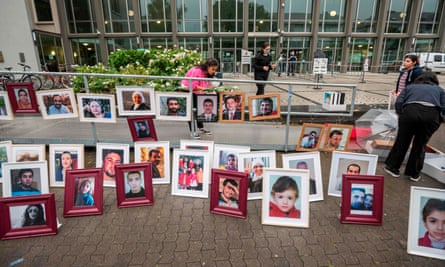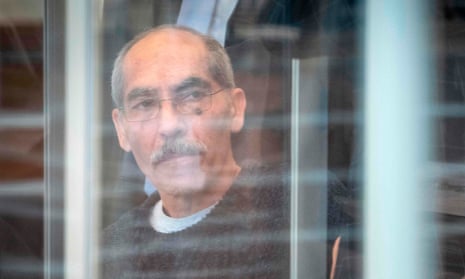For survivors of Syria’s brutal detention system, the landmark conviction of a former Syrian intelligence official for crimes against humanity represents a vital step towards justice.
“We initially hoped for a trial at the international criminal court, but nevertheless this is an important step,” said Hussein Ghrer, one of 24 former detainees of Branch 251, a military intelligence unit with its own prison in Damascus, who testified against Anwar Raslan.
“Finally, we have an official conviction saying that these individuals have committed crimes in the context of mass attacks on Syrians and systematic crimes against humanity. I believe this is the most important thing to build on in future.”
Raslan, a former colonel with the Syrian intelligence service, was convicted by a court in Koblenz, Germany, of crimes against humanity, including 27 counts of murder. He was accused by prosecutors of overseeing abuse, sexual assault and the torture of more than 4,000 people at Branch 251. The site became synonymous with brutal abuse by security officials after the government of Bashar al-Assad used maximum force to quell protests.
Raslan is the highest-ranking Syrian official to stand trial for atrocities committed in Syria. He was charged under the principle of universal jurisdiction, which allows the prosecution of serious crimes against international law, such as genocide and torture, in one country even if they happened elsewhere.

At least 100,000 people are recorded as detained or missing in Syria, the United Nations said in 2019, although activists say the true number may be far higher. The Syrian Network for Human Rights puts the figure at about 150,000 and estimates that nearly 15,000 people have died from torture in Syria since March 2011.
Human Rights Watch described this as “violence that is not readily visible: the hidden prisons and torture centres into which tens of thousands of Syrians have disappeared – sometimes to re-emerge years later, sometimes never to be heard from again”.
Raslan is the second person to be convicted in Koblenz for activities related to Branch 251, after the conviction last year of Eyad al-Gharib, a former intelligence officer, for his role in transporting detainees to the prison. The trial represented the first opportunity of its kind for former detainees such as Ghrer to testify about their treatment in detention. “I was interrogated and beaten all over my body, but the worst was seeing others being brutally tortured, because you don’t know what could happen next,” he said.
Ghrer also described the experience of seeing Raslan – the man who directed his torture and that of his fellow detainees – in the dock, a decade after he was arrested in Damascus for filming protests. “We were powerless, we were mistreated. [Raslan] was not mistreated, and he has a right to lawyers and translators,” he said.
“I wouldn’t want to be in his shoes, of course,” Ghrer added, “but to be in a place where we are holding him accountable, it feels good. Finally, we were able to pursue a kind of justice.
“I don’t believe in full justice – I believe in a journey towards justice and this is the first step.”
In a statement read out by his defence lawyers during the hearing, Raslan claimed he was not associated with torture and denied that it had taken place under his watch. Martin Holsky, a chief inspector with the Baden-Württemberg state police, later testified that Raslan told him: “With this many interrogations in one day, you can’t always be polite. With armed groups, you sometimes need to be stricter.”
“He doesn’t believe he did anything wrong,” said Ghrer. “I was in court many times, watching his expressions. He looks at us with disgust. As if he doesn’t believe he’s being held accountable, or he believes he’s not like other members of the regime.”
Other survivors agreed. “In my testimony, I said that I wish for him to spend a lot of time in prison so he could think about all of us,” said Ruham Hawash, who was detained at Branch 251 in 2012.
“I want him to think about all the people who testified against him in court, all the people that he tortured and whose torture he was responsible for during his career. I think with enough time he will not be able to run from these thoughts.”

Hawash said the trial in Koblenz represented an opportunity for justice she had not expected. “I was tortured at Branch 251. I felt like, at that time, a part of my dignity was taken from me. So another thing about this trial is that I feel like, for me personally, I’m getting some of my dignity back that I lost in 2012,” she said.
She also pointed to the body of evidence used to convicted Raslan, including thousands of photos of detainees tortured to death in prison, provided by a Syrian military photographer known only as Caesar. “This verdict is a tool to demonstrate that this regime uses systematic torture,” she said.
The verdict carries wider implications for countries across Europe, including the UK and Denmark, where governments have voiced proposals to return Syrian asylum seekers. “I see this trial not just as justice but as a sign to the world that this regime uses torture systematically – which also means we can’t send people back,” she said.
Raslan’s conviction also comes amid efforts by some governments across the Middle East to re-establish relations with Assad’s government, despite previously backing his overthrow. The verdict in Koblenz, as well as multiple ongoing trials against former regime officials in Germany and elsewhere across Europe, present opportunities for accountability alongside the risk that such trials might dissuade higher-level officials from within the Syrian regime from providing information, or being brought to justice outside Syria.
“Other perpetrators might see that they can’t get away with their crimes, but it also means they won’t leave Syria, or people who worked for the regime might not leave their posts,” said Hawash. “It’s complicated. But it’s still sending a strong message to them that we will strive for justice to hold those perpetrators accountable for their crimes against us and humanity.”
Yet for campaigners and the families of thousands of those still missing inside Syrian detention centres, Raslan’s conviction represents an important step to providing vital information about their fate.
“There are still more than 100,000 people in prison – we have no idea where they are and if they’re alive or dead. Justice cannot truly come while there are still people in jail,” said Lamis al-Khateeb, a member of the group Families for Freedom, who gathered outside court to witness Raslan’s sentencing.
